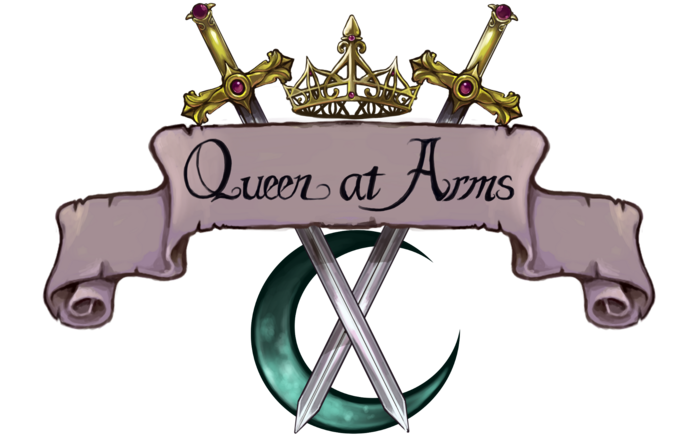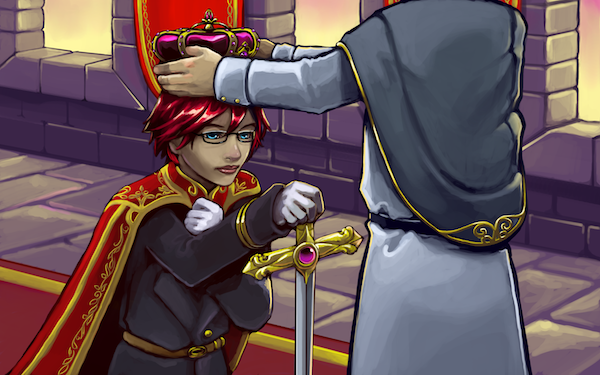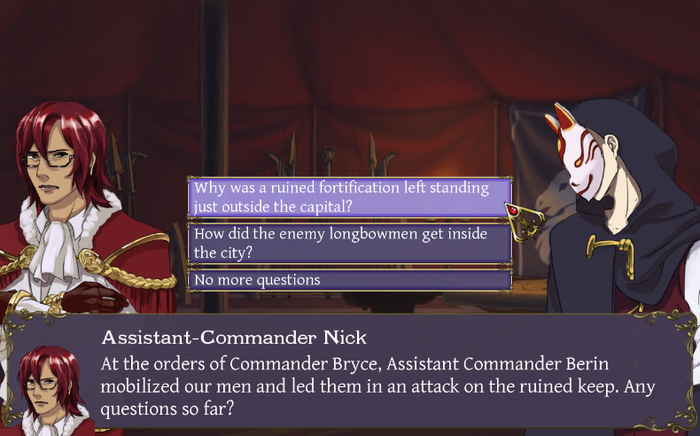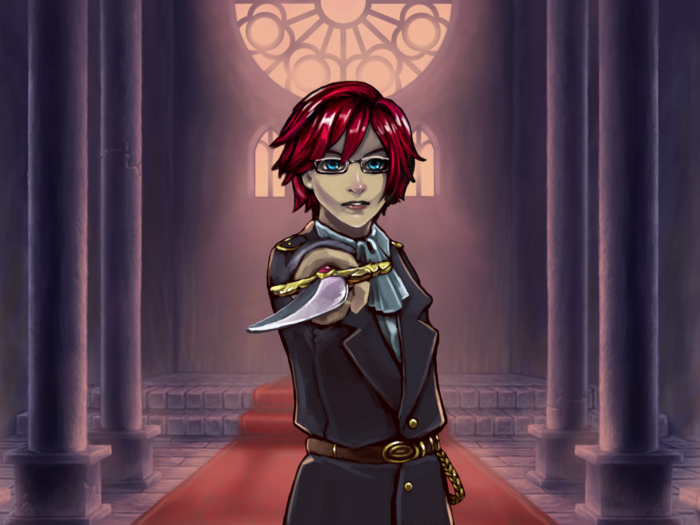Serenity and Diana Discuss Gender and Sexuality in Queen At Arms
with Marcus Estrada
[divider]Queen At Arms is an upcoming visual novel that was successfully funded not long after going live on Kickstarter. It seems that what genre fans were looking for was a new game with a truly unique protagonist. In this case it’s Marcus Cordale who was raised as a boy in order to hide their identity. From then, they joined an army and that is when players come in to experience and influence Marcus’ story.
I found myself immediately intrigued but also curious as to what the writers intentions were with their character. Might this be a trans narrative? Or is Marcus unhappy being perceived as male? Am I just reading far too much into it? These questions pushed me to contact the writers of Queen At Arms and they were kind enough to provide an immensely helpful response! After that it was decided to conduct a formal interview – the content of which is now available for everyone to read. The responses of Serenity and Diana both are fascinating and showcase an open mindedness that is integral to creating such stories.
[divider]Cliqist: First, could you share a brief synopsis of the Queen At Arms plotline?
Serenity: In Queen at Arms you play a woman thrust into the wake of a war she never thought she’d have to fight. She quickly finds herself given a position of leadership and with it the responsibilities and expectations that come with it. While battling to keep her men alive she also has to keep her real identity a secret. She isn’t the son of Orthera’s most respected knight, but his adopted daughter. (You may want to use pretty much anyone else’s summary here. I’d suggest Diana’s as she’s very good at them.)
Diana: Marcus Cordale was rescued as a young child from the court of the kingdom of Orthera, when her family was murdered in a violent political coup. The knight who saved her, Sir Thomas Cordale, raised her in the neighboring kingdom of Sylgard as a son, in order to shield her identity from those who still held enmity for Orthera’s overthrown regime. When she comes of age, she decides to join the army of Orthera, following in her adoptive brother Nicholas’s footsteps. Everything changes when a war breaks out between Sylgard and Orthera. The Ortheran army is thrown into disarray, and Marcus is soon put into a position of power, which she is vastly underprepared for, and is forced to make tough decisions in order to protect herself and those she cares about. Queen At Arms is a story of making friends and finding oneself during a time of strife—of love in a time of war, if you will—and of facing the difficult choices that arise when the lives of others rest in your hands.
Cliqist: When did considerations about protagonist Marcus’ gender identity come into the discussion? Was this an idea that was integral from the very beginning? How do the writers of Queen At Arms perceive Marcus in regards to gender (or lack thereof)?
Serenity: I’ve always found stories about gender both interesting and boggling. In my personal life I’ve always found the concept of masculine or feminine an odd one to swallow. While I’ve always understood the genetics behind it (men having parts women don’t) I’ve always had a difficult time grasping why those genetics means someone needs to act in a certain way or be attracted to certain things. Because of that I’ve always found characters that act outside of their gender to be the most interesting, and stories that involve breaking those stereotypes the most fun to write. It was sort of a no brainer for me when our producer told us that we wouldn’t be moving forward with the project I’d originally been hired on to do, and that he asked us to pitch him a new idea.
Since I was a one woman show on the writing scene for a while, I never really talked out her gender identity. I talked out the game’s plot, and I considered that, because of said plot, her motivations for keeping her gender secret were unclear even to her. Her adopted father always insisted that she live her identity out as his youngest son so that she could be safe, and because she loves and respects him she’s always done so. For Marcus, questioning this hasn’t really come to mind. For all intents and purposes (minus some bobs and tackles) she’s a boy and thinks of herself as such.
It wasn’t until I got more writers under me that the questions started to come up. My co-writer Diana really wanted to understand this character and she had a lot of heavy questions to toss my way. What Marcus considers herself was one of the guys, which was something that, until that point, I hadn’t actually vocalized. Marcus thinks of herself as male because she was raised to be male. She doesn’t feel that she’s been hiding anything about herself, being female wasn’t really all that different from being male in the small farming town where she grew up (women got down in the dirt just as much as men did). Even after she hit puberty it wasn’t a huge shift as it was chic for boys to mess around with boys—a trend that came over from Orthera. The fact that she is panromantic meant that she found women equally attractive and didn’t mind that she was expected marry one later in life—should there be a continued need to keep up a male appearance.
For Marcus it was the name rather than the gender that she gets hung up on. Marcus, as it was explained to her, was originally her adopted father’s (biological) son, one who he lost during the seige. That name belongs to a boy who was killed much too early and while she uses it, she doesn’t feel it belongs to her. However, she doesn’t actually have her own name that she can claim. Her true identity has been lost in her memory and it’s one her adoptive father never got the chance to reveal before he died. Her older brother knows who she started her life as, and that’s part of the driving force that makes her follow him into the Ortheran army in the first place. (Loneliness being the primary reason.)
Diana: When I came onto the project early this year, much of the initial planning for the game’s story had already been done, so I wanted to familiarize myself with the existing plot and characters as much as possible. Very early on it occurred to me that we would need to be very sensitive in the handling of how our romances operate, given that the main character is not ‘necessarily’ the gender the romantic interests perceive her to be. Queer and gender issues (including trans* issues) are of great personal importance to me, so exploring that side of the game’s interpersonal setting is something I have been and will continue to push for. Besides which, it makes for a fascinating and complex narrative.
To me, Marcus is best thought of as genderqueer, or at worst gender-apathetic. Her gender influences very little of her day to day motives and actions, beyond the occasional hoop she must jump through in order to conceal her biological features. She considers herself to be male on a superficial level, but she has always been curious about traditionally feminine things, which she has been in essence forbidden from exploring up to this point. However, she does not consider a feminine identity to be any more her ‘true’ self than a male one. While she seeks the truth of her identity, it is a question of origin and not gender that plagues her. She is simply her father’s child, and her brother’s sibling. Any inner identity beyond that is not something that has ever crossed her mind.
Cliqist: The Kickstarter page regularly refers to Marcus as “she”. What led to this decision? To me, it feels as though this may initially hinder prospective players from viewing the protagonist in any other way. Are there moments in the game intended to showcase Marcus’ acceptance or rejection of various gender roles?
Serenity: The Kickstarter refers to Marcus partly because of clarification in advertising. While Marcus herself uses “he” and we often use “he” in the game for when she’s being referred to, Marcus is still biologically a woman and using that gender pronoun is just for convenience of communication. So long as I use “she” the audience understands that she’s female, in a situation where she’s pretending to be male, and that gets half the plot across already. Our language has a distinct lack of gender neutral pronouns to use in this situation.
Diana: To clarify, it is the characters in game who refer to Marcus as “he.” The narrative is written in first-person, from Marcus’s perspective, so no pronouns are used to refer to her in the narration. As Serenity mentioned, referring to Marcus as “she” within the meta is an easy way for us to convey one of the games central conflicts—that she is forced to conceal the truth of her biological sex in order to disguise her identity. It is also a matter of clarity for our advertising; to refer to Marcus as “he” in the meta would be a bit disingenuous, but many people are unfamiliar with or have highly varied opinions of gender-neutral pronouns. While using “she” may hinder initial impressions, we hope that players will be able to decide for themselves how best to view Marcus’s gender.
As for moments in the game where exploration of gender roles comes into play, without spoiling much I can say that Prince Alastor’s ‘ingenious’ plan to throw a cross-dressing masquerade ball as a ploy to raise morale raises some very interesting questions on that front! On a more serious note, as Marcus progresses in developing relationships with the game’s various romantic interests, she is forced to consider how she views her gender and how she wants to be seen, especially in the routes where her identity will make a marked difference (either in raising or lowering a partner’s interest). This also comes into play in some of the interactions with her brother Nick, as he is initially the only character who knows the ‘truth’ of Marcus’s identity, and as a sibling is constantly concerned for various aspects of her wellbeing.
Cliqist: As the setup is not meant to take place in the present day, Marcus can’t simply state they’re “genderqueer and panromantic” (or any other terminology that folks use to define themselves today!). Does that make this whole discussion and in-game expression more difficult? How is the team working through these challenges?
Serenity: It’s actually not that difficult. The culture of the setting allows for boys to be intimate with other boys so long as they marry women later in life. As far as panromantic, that kind of goes unsaid. Marcus becomes attracted to who she’s attracted to and they react accordingly when they find out what her biological sex is. For Marcus gender doesn’t come into it until someone else brings it up.
Cliqist: So far, the game has a majority of romantic paths with men who do not know Marcus is effectively ‘disguised’. Will Queen At Arms delve into the complications of human sexuality? I.E., will some men initially attracted to Marcus as a “he” find the truth difficult to accept? Will others become more attracted because of it?
Serenity: Yes. Her brother makes a very big deal about her “real gender” and one of the boys will actually want to break things off when he finds out that she’s biologically female. However, as stated in the previous answer, the culture of this society is quite Greek in that the male body is the one being glorified and so it’s easily accepted that boys can fool around with other boys without it meaning that they are specifically attracted to boys.
Diana: This issue becomes more complicated when it comes to the female romantic interests (who will now be included thanks to our Kickstarter!). In Ortheran society, female homosexual dalliances are not nearly as socially acceptable as male-male interactions, and long term female-female romances are almost unheard of, even if some surely exist under wraps. Because of this, Marcus’s male presentation might actually make such romances easier to swallow on a social level, even though the characters themselves will feel a bit differently about the ‘truth.’
Cliqist: I have seen the game referenced in articles as an otome (girl x boy romance) title. Will the team be sure to voice that Queen At Arms could be interpreted in a whole host of ways – some of which are queer friendly?
Serenity: We’re certainly trying. The game that we’re making isn’t really conducive to speedy summation when it comes to getting a person’s attention. GxB (now GxB/G thanks to reaching our Kickstarter goals) Otome is the quickest way we know to advertise to the visual novel crowd what they’ll be able to expect in our fantasy wartime strategy game. When the game gets released we’ll be able to rely more on word of mouth to communicate the complex nature of the game to the audiences who would find it most interesting.
Diana: With the recent addition of the GxG romances, which we will be advertising, hopefully it will be apparent to audiences that Q@A is bit broader than your average otome game.
Cliqist: Is there anything else you would like to share about Queen At Arms with regard to gender, sexuality, or romance?
Serenity: In my most personal opinion, I find the whole thing very silly. You should be able to love who you love without any messy business preventing you from loving them. Your private parts are a strange way of dictating how a person should act or dress, and in fact actively hinders you managing to find the person who would find who you are inside attractive. Society has much more important things to be fussing over.
Diana: We are doing our best to make sure that all issues of gender and/or queer romance are handled in such a way that they are sensitive to their real world analogues, while still fitting within the setting, and so in the event that problematic situations arise within the game, we want it to be clear within the meta that they are considered as such. If anyone has any further questions or concerns about this, they are welcome and encouraged to contact myself or other members of the team. We want Queen At Arms to be the kind of game that an audience—any audience—can relate to, or at least enjoy, so input from our fans is appreciated and valued.
[divider]Thank you to Diana and Serenity for participating in our interview and providing such thoughtful responses! At the time of this publication, Queen At Arms is currently still seeking funding toward stretch goals such as random battles.
[divider][facebook][tweet][Google][pinterest][follow id=”Cliqist” size=”large” count=”true” ] [author image=”http://cliqist.com/wp-content/uploads/2014/01/marcus.jpg” ]Marcus is a fellow with a love for video games, horror, and Japanese food. When he’s not writing about games for a multitude of sites, he’s usually still playing one. One day when he became fed up with the way sites would ignore niche titles he decided to start his own site by the name of Pixel Pacas. Writing about video games is something he hopes to continue doing for many years to come. Some of Marcus’s favorite games include Silent Hill 2, Killer7, and The Sims. [/author]







